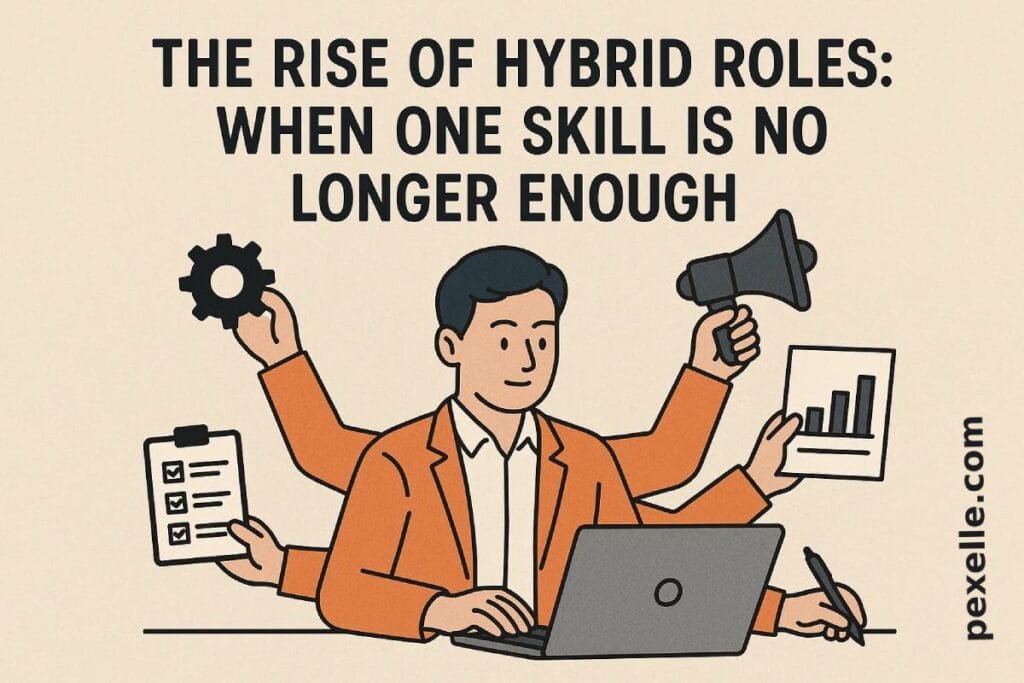The Rise of Hybrid Roles: When One Skill Is No Longer Enough

Once upon a time, jobs were simple. A marketer ran ads. A developer wrote code. A designer created visuals.
But in 2025, that world no longer exists. The lines between roles are blurring fast. Employers don’t just want specialists — they want hybrid talent.
👉 People who can combine multiple skills to solve complex problems.
👉 Professionals who understand both technology and business.
👉 Teams built on adaptability, not rigid job descriptions.
Welcome to the era of hybrid roles.
🌍 What Are Hybrid Roles?
A hybrid role is a position that blends two or more traditionally separate skill sets into one job.
Instead of being a “pure” marketer or programmer, today’s talent might be:
- 🧠 AI Product Strategist → understands machine learning and product roadmaps.
- 📊 Data Storyteller → combines data analytics and communication skills.
- 💻 Full-Stack Marketer → merges content, SEO, and marketing automation.
- 🧑💼 Tech-savvy HR Specialist → masters both human resources and HR tech platforms.
According to LinkedIn’s Global Skills Report 2025, 58% of emerging job roles now require at least two distinct skill sets — often spanning both technical and soft domains.
⚡ Why Hybrid Roles Are Growing So Fast
This shift didn’t happen by accident. Several forces are accelerating the rise of hybrid roles:
- AI and automation 🦾
As machines handle repetitive tasks, humans need to connect disciplines and solve higher-level problems. - Faster innovation cycles ⏩
Companies can’t afford siloed teams anymore. Cross-functional knowledge speeds up execution. - Digital transformation 🌐
Every department is now a tech department — marketing, finance, HR, you name it. - Smaller, smarter teams 💡
Startups and lean enterprises prefer employees who can wear multiple hats efficiently.
Hybrid roles don’t just save costs. They make organizations more adaptive.
🧭 What This Means for Job Seekers
In a hybrid world, having one strong skill is no longer enough.
What sets top candidates apart is their ability to combine skills strategically.
Here’s how job seekers can thrive:
- 🧠 Stack complementary skills: e.g., coding + design, marketing + data, leadership + AI tools.
- 📁 Build portfolios that demonstrate multiple capabilities.
- 🪙 Earn micro-credentials to prove versatility.
- 🔁 Stay adaptable — the skills you need today may not be the same tomorrow.
Example: A front-end developer who also understands UX principles is far more valuable than someone who only codes pixels.
🧰 How Companies Benefit from Hybrid Talent
Forward-thinking companies are already redesigning job descriptions around skills, not titles.
Instead of “Marketing Manager,” they look for:
- content strategy
- automation tools
- data analysis
- storytelling.
✅ Benefits for companies:
- Faster innovation
- Leaner, more flexible teams
- Fewer communication gaps
- Stronger collaboration between departments
This is why hybrid roles are becoming the backbone of modern organizations.
🪄 Final Thought
The job market is no longer about fitting into one box.
It’s about connecting dots — merging skills to build unique value.
🎯 “Hybrid roles aren’t the future of work — they’re the present.”
Your career edge isn’t just what you know… it’s how many things you can connect.
If your skill set is a single blade, a hybrid role turns it into a Swiss Army knife 🧰.
Source : Medium.com




